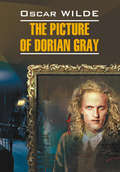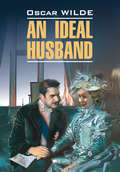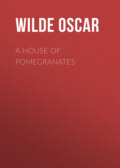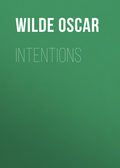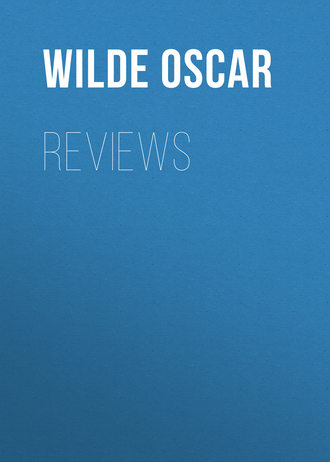
Оскар Уайльд
Reviews
A THOUGHT-READER’S NOVEL
(Pall Mall Gazette, June 5, 1889.)
There is a great deal to be said in favour of reading a novel backwards. The last page is, as a rule, the most interesting, and when one begins with the catastrophe or the dénoûment one feels on pleasant terms of equality with the author. It is like going behind the scenes of a theatre. One is no longer taken in, and the hairbreadth escapes of the hero and the wild agonies of the heroine leave one absolutely unmoved. One knows the jealously-guarded secret, and one can afford to smile at the quite unnecessary anxiety that the puppets of fiction always consider it their duty to display. In the case of Mr. Stuart Cumberland’s novel, The Vasty Deep, as he calls it, the last page is certainly thrilling and makes us curious to know more about ‘Brown, the medium.’
Scene, a padded room in a mad-house in the United States.
A gibbering lunatic discovered dashing wildly about the chamber as if in the act of chasing invisible forms.
‘This is our worst case,’ says a doctor opening the cell to one of the visitors in lunacy. ‘He was a spirit medium and he is hourly haunted by the creations of his fancy. We have to carefully watch him, for he has developed suicidal tendencies.’
The lunatic makes a dash at the retreating form of his visitors, and, as the door closes upon him, sinks with a yell upon the floor.
A week later the lifeless body of Brown, the medium, is found suspended from the gas bracket in his cell.
How clearly one sees it all! How forcible and direct the style is! And what a thrilling touch of actuality the simple mention of the ‘gas bracket’ gives us! Certainly The Vasty Deep is a book to be read.
And we have read it; read it with great care. Though it is largely autobiographical, it is none the less a work of fiction and, though some of us may think that there is very little use in exposing what is already exposed and revealing the secrets of Polichinelle, no doubt there are many who will be interested to hear of the tricks and deceptions of crafty mediums, of their gauze masks, telescopic rods and invisible silk threads, and of the marvellous raps they can produce simply by displacing the peroneus longus muscle! The book opens with a description of the scene by the death-bed of Alderman Parkinson. Dr. Josiah Brown, the eminent medium, is in attendance and tries to comfort the honest merchant by producing noises on the bedpost. Mr. Parkinson, however, being extremely anxious to revisit Mrs. Parkinson, in a materialised form after death, will not be satisfied till he has received from his wife a solemn promise that she will not marry again, such a marriage being, in his eyes, nothing more nor less than bigamy. Having received an assurance to this effect from her, Mr. Parkinson dies, his soul, according to the medium, being escorted to the spheres by ‘a band of white-robed spirits.’ This is the prologue. The next chapter is entitled ‘Five Years After.’ Violet Parkinson, the Alderman’s only child, is in love with Jack Alston, who is ‘poor, but clever.’ Mrs. Parkinson, however, will not hear of any marriage till the deceased Alderman has materialised himself and given his formal consent. A seance is held at which Jack Alston unmasks the medium and shows Dr. Josiah Brown to be an impostor – a foolish act, on his part, as he is at once ordered to leave the house by the infuriated Mrs. Parkinson, whose faith in the Doctor is not in the least shaken by the unfortunate exposure.
The lovers are consequently parted. Jack sails for Newfoundland, is shipwrecked and carefully, somewhat too carefully, tended by ‘La-ki-wa, or the Star that shines,’ a lovely Indian maiden who belongs to the tribe of the Micmacs. She is a fascinating creature who wears ‘a necklace composed of thirteen nuggets of pure gold,’ a blanket of English manufacture and trousers of tanned leather. In fact, as Mr. Stuart Cumberland observes, she looks ‘the embodiment of fresh dewy morn.’ When Jack, on recovering his senses, sees her, he naturally inquires who she is. She answers, in the simple utterance endeared to us by Fenimore Cooper, ‘I am La-ki-wa. I am the only child of my father, Tall Pine, chief of the Dildoos.’ She talks, Mr. Cumberland informs us, very good English. Jack at once entrusts her with the following telegram which he writes on the back of a five-pound note: —
Miss Violet Parkinson, Hotel Kronprinz, Franzensbad, Austria. – Safe. JACK.
But La-ki-wa, we regret to say, says to herself, ‘He belongs to Tall Pine, to the Dildoos, and to me,’ and never sends the telegram. Subsequently, La-ki-wa proposes to Jack who promptly rejects her and, with the usual callousness of men, offers her a brother’s love. La-ki-wa, naturally, regrets the premature disclosure of her passion and weeps. ‘My brother,’ she remarks, ‘will think that I have the timid heart of a deer with the crying voice of a papoose. I, the daughter of Tall Pine – I a Micmac, to show the grief that is in my heart. O, my brother, I am ashamed.’ Jack comforts her with the hollow sophistries of a civilised being and gives her his photograph. As he is on his way to the steamer he receives from Big Deer a soiled piece of a biscuit bag. On it is written La-ki-wa’s confession of her disgraceful behaviour about the telegram. ‘His thoughts,’ Mr. Cumberland tells us, ‘were bitter towards La-ki-wa, but they gradually softened when he remembered what he owed her.’
Everything ends happily. Jack arrives in England just in time to prevent Dr. Josiah Brown from mesmerising Violet whom the cunning doctor is anxious to marry, and he hurls his rival out of the window. The victim is discovered ‘bruised and bleeding among the broken flower-pots’ by a comic policeman. Mrs. Parkinson still believes in spiritualism, but refuses to have anything to do with Brown as she discovers that the deceased Alderman’s ‘materialised beard’ was made only of ‘horrid, coarse horsehair.’ Jack and Violet are married at last and Jack is horrid enough to send to ‘La-ki-wa’ another photograph. The end of Dr. Brown is chronicled above. Had we not known what was in store for him we should hardly have got through the book. There is a great deal too much padding in it about Dr. Slade and Dr. Bartram and other mediums, and the disquisitions on the commercial future of Newfoundland seem endless and are intolerable. However, there are many publics, and Mr. Stuart Cumberland is always sure of an audience. His chief fault is a tendency to low comedy; but some people like low comedy in fiction.
The Vasty Deep: A Strange Story of To-day. By Stuart Cumberland. (Sampson Low and Co.)
THE POETS’ CORNER – X
(Pall Mall Gazette, June 24, 1889.)
Is Mr. Alfred Austin among the Socialists? Has somebody converted the respectable editor of the respectable National Review? Has even dulness become revolutionary? From a poem in Mr. Austin’s last volume this would seem to be the case. It is perhaps unfair to take our rhymers too seriously. Between the casual fancies of a poet and the callous facts of prose there is, or at least there should be, a wide difference. But since the poem in question, Two Visions, as Mr. Austin calls it, was begun in 1863 and revised in 1889 we may regard it as fully representative of Mr. Austin’s mature views. He gives us, at any rate, in its somewhat lumbering and pedestrian verses, his conception of the perfect state:
Fearless, unveiled, and unattended
Strolled maidens to and fro:
Youths looked respect, but never bended
Obsequiously low.
And each with other, sans condition,
Held parley brief or long,
Without provoking coarse suspicion
Of marriage, or of wrong.
All were well clad, and none were better,
And gems beheld I none,
Save where there hung a jewelled fetter,
Symbolic, in the sun.
I saw a noble-looking maiden
Close Dante’s solemn book,
And go, with crate of linen laden
And wash it in the brook.
Anon, a broad-browed poet, dragging
A load of logs along,
To warm his hearth, withal not flagging
In current of his song.
Each one some handicraft attempted
Or helped to till the soil:
None but the aged were exempted
From communistic toil.
Such an expression as ‘coarse suspicion of marriage’ is not very fortunate; the log-rolling poet of the fifth stanza is an ideal that we have already realised and one in which we had but little comfort, and the fourth stanza leaves us in doubt whether Mr. Austin means that washerwomen are to take to reading Dante, or that students of Italian literature are to wash their own clothes. But, on the whole, though Mr. Austin’s vision of the citta divina of the future is not very inspiriting, it is certainly extremely interesting as a sign of the times, and it is evident from the two concluding lines of the following stanzas that there will be no danger of the intellect being overworked:
Age lorded not, nor rose the hectic
Up to the cheek of youth;
But reigned throughout their dialectic
Sobriety of truth.
And if a long-held contest tended
To ill-defined result,
It was by calm consent suspended
As over-difficult.
Mr. Austin, however, has other moods, and, perhaps, he is at his best when he is writing about flowers. Occasionally he wearies the reader by tedious enumerations of plants, lacking indeed reticence and tact and selection in many of his descriptions, but, as a rule, he is very pleasant when he is babbling of green fields. How pretty these stanzas from the dedication are!
When vines, just newly burgeoned, link
Their hands to join the dance of Spring,
Green lizards glisten from cleft and chink,
And almond blossoms rosy pink
Cluster and perch, ere taking wing;
Where over strips of emerald wheat
Glimmer red peach and snowy pear,
And nightingales all day long repeat
Their love-song, not less glad than sweet
They chant in sorrow and gloom elsewhere;
Where purple iris-banners scale
Defending walls and crumbling ledge,
And virgin windflowers, lithe and frail,
Now mantling red, now trembling pale,
Peep out from furrow and hide in hedge.
Some of the sonnets also (notably, one entitled When Acorns Fall) are very charming, and though, as a whole, Love’s Widowhood is tedious and prolix, still it contains some very felicitous touches. We wish, however, that Mr. Austin would not write such lines as
Pippins of every sort, and codlins manifold.
‘Codlins manifold’ is a monstrous expression.
Mr. W. J. Linton’s fame as a wood-engraver has somewhat obscured the merits of his poetry. His Claribel and Other Poems, published in 1865, is now a scarce book, and far more scarce is the collection of lyrics which he printed in 1887 at his own press and brought out under the title of Love-Lore. The large and handsome volume that now lies before us contains nearly all these later poems as well as a selection from Claribel and many renderings, in the original metre, of French poems ranging from the thirteenth century to our own day. A portrait of Mr. Linton is prefixed, and the book is dedicated ‘To William Bell Scott, my friend for nearly fifty years.’ As a poet Mr. Linton is always fanciful with a studied fancifulness, and often felicitous with a chance felicity. He is fascinated by our seventeenth-century singers, and has, here and there, succeeded in catching something of their quaintness and not a little of their charm. There is a pleasant flavour about his verse. It is entirely free from violence and from vagueness, those two besetting sins of so much modern poetry. It is clear in outline and restrained in form, and, at its best, has much that is light and lovely about it. How graceful, for instance, this is!
BARE FEET
O fair white feet! O dawn-white feet
Of Her my hope may claim!
Bare-footed through the dew she came
Her Love to meet.
Star-glancing feet, the windflowers sweet
Might envy, without shame,
As through the grass they lightly came,
Her Love to meet.
O Maiden sweet, with flower-kiss’d feet!
My heart your footstool name!
Bare-footed through the dew she came,
Her Love to meet.
‘Vindicate Gemma!’ was Longfellow’s advice to Miss Héloïse Durant when she proposed to write a play about Dante. Longfellow, it may be remarked, was always on the side of domesticity. It was the secret of his popularity. We cannot say, however, that Miss Durant has made us like Gemma better. She is not exactly the Xantippe whom Boccaccio describes, but she is very boring, for all that:
GEMMA. The more thou meditat’st, more mad art thou.
Clowns, with their love, can cheer poor wives’ hearts more
O’er black bread and goat’s cheese than thou canst mine
O’er red Vernaccia, spite of all thy learning!
Care I how tortured spirits feel in hell?
DANTE. Thou tortur’st mine.
GEMMA. Or how souls sing in heaven?
DANTE. Would I were there.
GEMMA. All folly, naught but folly.
DANTE. Thou canst not understand the mandates given
To poets by their goddess Poesy..
GEMMA. Canst ne’er speak prose? Why daily clothe thy thoughts
In strangest garb, as if thy wits played fool
At masquerade, where no man knows a maid
From matron? Fie on poets’ mutterings!
DANTE (to himself). If, then, the soul absorbed at last to whole —
GEMMA. Fie! fie! I say. Art thou bewitched?
DANTE. O! peace.
GEMMA. Dost thou deem me deaf and dumb?
DANTE. O! that thou wert.
Dante is certainly rude, but Gemma is dreadful. The play is well meant but it is lumbering and heavy, and the blank verse has absolutely no merit.
Father O’Flynn and Other Irish Lyrics, by Mr. A. P. Graves, is a collection of poems in the style of Lover. Most of them are written in dialect, and, for the benefit of English readers, notes are appended in which the uninitiated are informed that ‘brogue’ means a boot, that ‘mavourneen’ means my dear, and that ‘astore’ is a term of affection. Here is a specimen of Mr. Graves’s work:
‘Have you e’er a new song,
My Limerick Poet,
To help us along
Wid this terrible boat,
Away over to Tork?’
‘Arrah I understand;
For all of your work,
’Twill tighten you, boys,
To cargo that sand
To the overside strand,
Wid the current so strong
Unless you’ve a song —
A song to lighten and brighten you, boys… ’
It is a very dreary production and does not ‘lighten and brighten’ us a bit. The whole volume should be called The Lucubrations of a Stage Irishman.
The anonymous author of The Judgment of the City is a sort of bad Blake. So at least his prelude seems to suggest:
Time, the old viol-player,
For ever thrills his ancient strings
With the flying bow of Fate, and thence
Much discord, but some music, brings.
His ancient strings are truth,
Love, hate, hope, fear;
And his choicest melody
Is the song of the faithful seer.
As he progresses, however, he develops into a kind of inferior Clough and writes heavy hexameters upon modern subjects:
Here for a moment stands in the light at the door of a playhouse,
One who is dignified, masterly, hard in the pride of his station;
Here too, the stateliest of matrons, sour in the pride of her station;
With them their daughter, sad-faced and listless, half-crushed to their likeness.
He has every form of sincerity except the sincerity of the artist, a defect that he shares with most of our popular writers.
(1) Love’s Widowhood and Other Poems. By Alfred Austin. (Macmillan and Co.)
(2) Poems and Translations. By W. J. Linton. (Nimmo.)
(3) Dante: a Dramatic Poem. By Héloïse Durant. (Kegan Paul.)
(4) Father O’Flynn and Other Irish Lyrics. By A. P. Graves. (Swan Sonnenschein and Co.)
(5) The Judgment of the City and Other Poems. (Swan Sonnenschein and Co.)
MR. SWINBURNE’S LAST VOLUME
(Pall Mall Gazette, June 27, 1889.)
Mr. Swinburne once set his age on fire by a volume of very perfect and very poisonous poetry. Then he became revolutionary and pantheistic, and cried out against those that sit in high places both in heaven and on earth. Then he invented Marie Stuart and laid upon us the heavy burden of Bothwell. Then he retired to the nursery and wrote poems about children of a somewhat over-subtle character. He is now extremely patriotic, and manages to combine with his patriotism a strong affection for the Tory party. He has always been a great poet. But he has his limitations, the chief of which is, curiously enough, the entire lack of any sense of limit. His song is nearly always too loud for his subject. His magnificent rhetoric, nowhere more magnificent than in the volume that now lies before us, conceals rather than reveals. It has been said of him, and with truth, that he is a master of language, but with still greater truth it may be said that Language is his master. Words seem to dominate him. Alliteration tyrannises over him. Mere sound often becomes his lord. He is so eloquent that whatever he touches becomes unreal.
Let us turn to the poem on the Armada:
The wings of the south-west wind are widened; the breath of his fervent lips,
More keen than a sword’s edge, fiercer than fire, falls full on the plunging ships.
The pilot is he of the northward flight, their stay and their steersman he;
A helmsman clothed with the tempest, and girdled with strength to constrain the sea.
And the host of them trembles and quails, caught fast in his hand as a bird in the toils;
For the wrath and the joy that fulfil him are mightier than man’s, whom he slays and spoils.
And vainly, with heart divided in sunder, and labour of wavering will,
The lord of their host takes counsel with hope if haply their star shine still.
Somehow we seem to have heard all this before. Does it come from the fact that of all the poets who ever lived Mr. Swinburne is the one who is the most limited in imagery? It must be admitted that he is so. He has wearied us with his monotony. ‘Fire’ and the ‘Sea’ are the two words ever on his lips. We must confess also that this shrill singing – marvellous as it is – leaves us out of breath. Here is a passage from a poem called A Word with the Wind:
Be the sunshine bared or veiled, the sky superb or shrouded,
Still the waters, lax and languid, chafed and foiled,
Keen and thwarted, pale and patient, clothed with fire or clouded,
Vex their heart in vain, or sleep like serpents coiled.
Thee they look for, blind and baffled, wan with wrath and weary,
Blown for ever back by winds that rock the bird:
Winds that seamews breast subdue the sea, and bid the dreary
Waves be weak as hearts made sick with hope deferred.
Let the clarion sound from westward, let the south bear token
How the glories of thy godhead sound and shine:
Bid the land rejoice to see the land-wind’s broad wings broken,
Bid the sea take comfort, bid the world be thine.
Verse of this kind may be justly praised for the sustained strength and vigour of its metrical scheme. Its purely technical excellence is extraordinary. But is it more than an oratorical tour de force? Does it really convey much? Does it charm? Could we return to it again and again with renewed pleasure? We think not. It seems to us empty.
Of course, we must not look to these poems for any revelation of human life. To be at one with the elements seems to be Mr. Swinburne’s aim. He seeks to speak with the breath of wind and wave. The roar of the fire is ever in his ears. He puts his clarion to the lips of Spring and bids her blow, and the Earth wakes from her dreams and tells him her secret. He is the first lyric poet who has tried to make an absolute surrender of his own personality, and he has succeeded. We hear the song, but we never know the singer. We never even get near to him. Out of the thunder and splendour of words he himself says nothing. We have often had man’s interpretation of Nature; now we have Nature’s interpretation of man, and she has curiously little to say. Force and Freedom form her vague message. She deafens us with her clangours.
But Mr. Swinburne is not always riding the whirlwind and calling out of the depths of the sea. Romantic ballads in Border dialect have not lost their fascination for him, and this last volume contains some very splendid examples of this curious artificial kind of poetry. The amount of pleasure one gets out of dialect is a matter entirely of temperament. To say ‘mither’ instead of ‘mother’ seems to many the acme of romance. There are others who are not quite so ready to believe in the pathos of provincialisms. There is, however, no doubt of Mr. Swinburne’s mastery over the form, whether the form be quite legitimate or not. The Weary Wedding has the concentration and colour of a great drama, and the quaintness of its style lends it something of the power of a grotesque. The ballad of The Witch-Mother, a mediæval Medea who slays her children because her lord is faithless, is worth reading on account of its horrible simplicity. The Bride’s Tragedy, with its strange refrain of
In, in, out and in,
Blaws the wind and whirls the whin:
The Jacobite’s Exile—
O lordly flow the Loire and Seine,
And loud the dark Durance:
But bonnier shine the braes of Tyne
Than a’ the fields of France;
And the waves of Till that speak sae still
Gleam goodlier where they glance:
The Tyneside Widow and A Reiver’s Neck-verse are all poems of fine imaginative power, and some of them are terrible in their fierce intensity of passion. There is no danger of English poetry narrowing itself to a form so limited as the romantic ballad in dialect. It is of too vital a growth for that. So we may welcome Mr. Swinburne’s masterly experiments with the hope that things which are inimitable will not be imitated. The collection is completed by a few poems on children, some sonnets, a threnody on John William Inchbold, and a lovely lyric entitled The Interpreters.
In human thought have all things habitation;
Our days
Laugh, lower, and lighten past, and find no station
That stays.
But thought and faith are mightier things than time
Can wrong,
Made splendid once by speech, or made sublime
By song.
Remembrance, though the tide of change that rolls
Wax hoary,
Gives earth and heaven, for song’s sake and the soul’s,
Their glory.
Certainly, ‘for song’s sake’ we should love Mr. Swinburne’s work, cannot, indeed, help loving it, so marvellous a music-maker is he. But what of the soul? For the soul we must go elsewhere.
Poems and Ballads. Third Series. By Algernon Charles Swinburne. (Chatto and Windus.)



